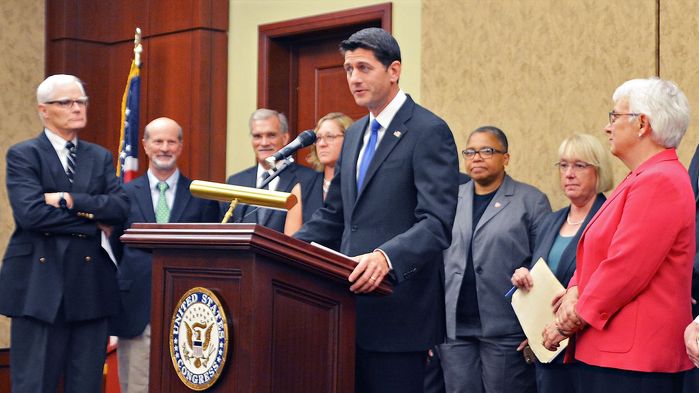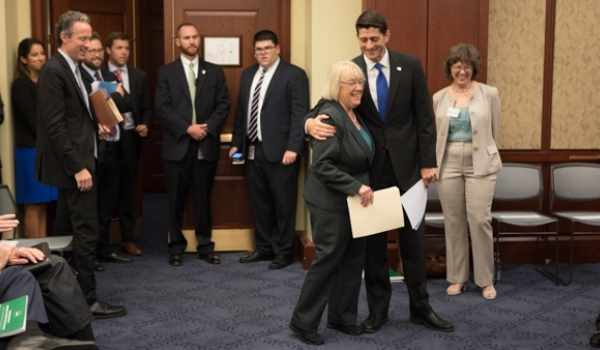
Michael Freda, Commission on Evidence-Based Policymaking, published in ScienceInsider
|

From Speaker Ryan's website: https://www.speaker.gov/press-release/speaker-ryan-pledges-next-steps-evidence-based-policymaking
|
The
Commission on Evidence-Based Policymaking (CEP), which
includes a number of ASA fellows, issued its
final report September 7.
Titled,
The Promise of Evidence-Based Policymaking, the highlights from the executive summary--based on a quick first reading--include
- Vision: The Commission "envisions a future in which rigorous evidence is created efficiently, as a routine part of government operations, and used to construct effective public policy. The Federal government has already taken important steps towards accomplishing this vision, but much work remains."
- What's attainable: "existing data is now possible in conjunction with stronger privacy and legal protections, as well as increased transparency and accountability. The Commission believes that improved access to data under more privacy-protective conditions can lead to an increase in both the quantity and the quality of evidence to
inform important program and policy decisions."
- Privacy Risk: "Traditionally, increasing access to confidential data presumed significantly increasing privacy risk. The Commission rejects that idea. The Commission believes there are steps that can be taken to improve data security and privacy protections beyond what exists today, while increasing the production of evidence."
- Recommendations "for fundamental improvements to the Federal government’s evidence-building systems and capabilities... [include] (1) how the Federal government can provide the infrastructure for secure access to data, (2) the mechanisms to improve privacy protections and transparency about the uses of data for evidence building, and (3) the institutional capacity to support evidence building."
For the first recommendations on "Improving Secure, Private, and Confidential Data Access, recognizing "the country’s laws and practices are not currently optimized to support the use of data for evidence building, nor in a manner that best protects privacy", first and foremost they recommend a "National Secure Data Service to facilitate access to data for evidence building while ensuring privacy and transparency in how those data are used." The five other recommendations here deal with stringent privacy qualifications; reviewing and revising "laws authorizing Federal data collection and use to ensure that limited access to administrative and survey data"; "state-collected quarterly earnings data"; making available "additional state-collected data about Federal programs available for evidence building"; and developing " uniform process for external researchers to apply and qualify for secure access to confidential government data for evidence-building purposes."
These recommendations are followed by five more for "Implementing the National Secure Data Service." The last five recommendations are for "Strengthening Federal Evidence-Building Capacity", including "a Chief Evaluation Officer in each department to coordinate evaluation and policy research and to collaborate with other evidence-building functions within Federal departments."
In the concluding remarks of the executive summary, the following sentences are notable to me:
- "Generating and using evidence to inform government policymaking and program administration is not a partisan issue."
- "The Congress, the President, and the American people are ill-served by this state of affairs", i.e., "data access is limited, privacy-protecting practices are inadequate, and the capacity to generate the evidence needed to support policy decisions is insufficient."
- "The Commission proposes modernizing the country’s evidence-building capacity to make sure our government’s decision-making process is among the best in the world, now and in the future."
I will be adding more reaction below as I read more of the report, discuss with others, and hear what others have to say. In the meantime, please let me know your reactions. I'm sorry for any typos in the above that might have been caused by cutting and pasting from the pdf documnet.
---New Content since 9/7 posting of this blog below---
Perhaps of particular interest to the statistical community is the definition of evidence:
this report uses the shorthand “evidence” to refer to information produced by “statistical activities” with a “statistical purpose” that is potentially useful when evaluating government programs and policies.
For next steps, Speaker Paul Ryan and Senator Paul Murray--who worked together to create the commission--
announced at the
9/7 press conference that they
are working on legislation—and hope to introduce it soon—to turn several of the nearly two dozen recommendations into law and lay down a foundation for even more work to come.
“These initial recommendations, part of the “Foundations for Evidenced-Based Policymaking Act,” represent important down payments on the three main areas of recommendations: expanding access; modernizing privacy; and strengthening the capacity for evaluation.
“The down payment legislation will ensure we make immediate progress while we hear from our constituents and stakeholders—and while we work with the Commissioners and committees of jurisdiction on the remaining recommendations."
Continuing those comments, Senator Murray said the Bipartisan Policy Center will continue the work of the Commission under the leadership of the Commission Co-Chairs, Katharine Abraham and Ron Haskins. Commission Policy and Research Director Nick Hart will be the director of that effort beginning September 11.
Two recommendations that stand out for the federal statistical agencies are 3-3 and 3-4, the first recommending a statistical agency head have more responsibility on a department's evidence-based policymaking and the other urging Congress codify
OMB Statistical Policy Directive #1:
REC. 3-3: The President should direct Federal departments to assign a senior official the responsibility for coordinating access to and stewardship of the department’s data resources for evidence building in collaboration with senior department information technology, privacy, and other leaders. A Principal Statistical Agency head, or other appropriately qualified senior official, should serve this function.
REC. 3-4: The Congress and the President should enact legislation to codify relevant portions of Office of Management and Budget Statistical Policy Directive #1 to protect public trust by ensuring that data acquired under a pledge of confidentiality are kept confidential and used exclusively for statistical purposes.
See also:
- What’s the evidence? Congress struggles to understand new report on evidence-based policy, Jeffrey Mervis, Science, 9/28/17.
- How to collect better data on government programs—and improve privacy, too, Jeffrey Mervis, ScienceInsider, 9/8/17.
- Members of Commission on Evidence-Based Policymaking being named; Include ASA Fellows, 5/23/16 blog entry
- Blog entries by Amy Nussbaum, such as these: Third Meeting of the Commission for Evidence-Based Policymaking and Commission on Evidence-Based Policymaking: Public Hearing
- ASA's comments to the Commission at the October 21, 2016 public hearing.
See other ASA Science Policy blog entries. For ASA science policy updates, follow @ASA_SciPol on Twitter.